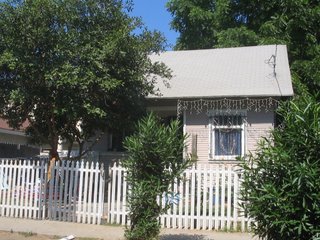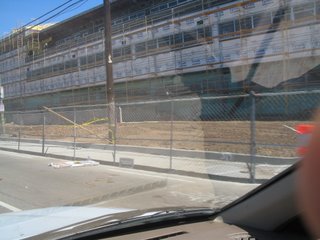Mole City
Markets and Migration
Despite an increase in inventory levels, an accumulation aided by a purchase volume deduction, housing inventory remains low throughout West Adams and South Los Angeles.
Inventory, in my recent experience, has been most commonly generated by death, departure (persons leaving Los Angeles for cheaper housing markets), and divestment (the liquidation of "Single Family" rental properties).

Chief among the departing, African Americans are leaving Los Angeles, some for the relatively inexpensive exurbs like Palmdale and Fontana, many for the South.
This "reverse migration", largely attributed to an improved racial climate, family ties, cost of living factors, cultural identity ("kinship") and the African American college system has made the South the country's only region with a growing African American population.
Between 1996 and 2000 alone, according to Black Enterprise magazine, Chicago, San Francisco and Los Angeles each lost between 3 and 6% of its African American population. Conversely newcomers made up 5.5, 7.6, and 9.6% of the growing black populations in Dallas, Charlotte, and Atlanta respectively.
According to an analysis by Manuel Pastor, a professor at UC Santa Cruz, the city of Compton in 1980 was 80% African American and 20% Hispanic; and, by 2000 had become 60% Hispanic and 40% African American.

In Los Angeles, one Rand Corporation study suggests that African Americans have been unable, possibly displaced by immigrants, to infiltrate the growing service economy.
Derek and Jay, who asked to be described as "black businessmen", were willing to speak on the subject:
Jay: "African Americans moved/are moving to the suburbs and elsewhere for the same reason whites did, concerns about gangs, schools. It's more unsafe for us here than it is for you."
Derek: [Regarding Reverse Migration] "Sure there's concerns about a loss of political influence too, but a lot of it is business."
Jay: "There's a "roots" thing. Most of our families don't come from here and are only here in part. So there's a social network which we can easily tap into elsewhere."
Derek: "The poor can't afford to leave and the rich don't have to, but the middle class--our entrepeneurial backbone--is going."
Jay: "It's an immigrant city, and the opportunities in business are here for the immigrants. Not just the Hispanics, but the Chinese, the Persians...."
Derek: "It ain't no Chocolate City."
Jay: "It's a Chocolate Mole City."
Despite an increase in inventory levels, an accumulation aided by a purchase volume deduction, housing inventory remains low throughout West Adams and South Los Angeles.
Inventory, in my recent experience, has been most commonly generated by death, departure (persons leaving Los Angeles for cheaper housing markets), and divestment (the liquidation of "Single Family" rental properties).

Chief among the departing, African Americans are leaving Los Angeles, some for the relatively inexpensive exurbs like Palmdale and Fontana, many for the South.
This "reverse migration", largely attributed to an improved racial climate, family ties, cost of living factors, cultural identity ("kinship") and the African American college system has made the South the country's only region with a growing African American population.
Between 1996 and 2000 alone, according to Black Enterprise magazine, Chicago, San Francisco and Los Angeles each lost between 3 and 6% of its African American population. Conversely newcomers made up 5.5, 7.6, and 9.6% of the growing black populations in Dallas, Charlotte, and Atlanta respectively.
According to an analysis by Manuel Pastor, a professor at UC Santa Cruz, the city of Compton in 1980 was 80% African American and 20% Hispanic; and, by 2000 had become 60% Hispanic and 40% African American.

In Los Angeles, one Rand Corporation study suggests that African Americans have been unable, possibly displaced by immigrants, to infiltrate the growing service economy.
Derek and Jay, who asked to be described as "black businessmen", were willing to speak on the subject:
Jay: "African Americans moved/are moving to the suburbs and elsewhere for the same reason whites did, concerns about gangs, schools. It's more unsafe for us here than it is for you."
Derek: [Regarding Reverse Migration] "Sure there's concerns about a loss of political influence too, but a lot of it is business."
Jay: "There's a "roots" thing. Most of our families don't come from here and are only here in part. So there's a social network which we can easily tap into elsewhere."
Derek: "The poor can't afford to leave and the rich don't have to, but the middle class--our entrepeneurial backbone--is going."
Jay: "It's an immigrant city, and the opportunities in business are here for the immigrants. Not just the Hispanics, but the Chinese, the Persians...."
Derek: "It ain't no Chocolate City."
Jay: "It's a Chocolate Mole City."
Labels: Ghettolicious

<< Home